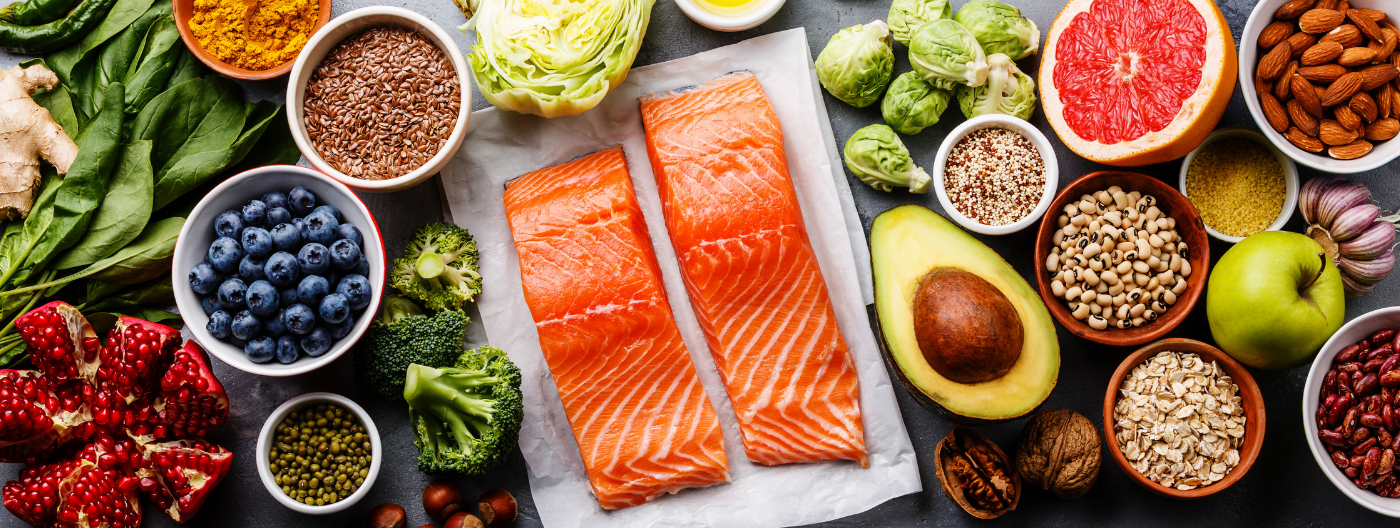Moving Lives, Shaping Futures | The Arthritis Movement>About Arthritis>Arthritis Insights>Postive Health Habits>Anti-Inflammatory Diet Made Easy
Following an anti-inflammatory diet will not cure arthritis, however for many people it is an effective way of controlling symptoms, maintaining a healthy weight and reducing the risk of developing other health problems. Recent studies have also found that a diet high in ultra-processed food (one of the things to avoid in an anti-Inflammatory diet) was associated with higher rates of disease and mortality.
So what is an anti-inflammatory diet and how can you incorporate it into your life?
Read on!

An anti-inflammatory diet involves eating nutrient-rich, whole foods that reduce inflammation in the body. It contains plenty of fibre, antioxidants, and omega-3s. This means a diet rich in vegetables, whole fruit, whole grains, legumes, and fatty fish – that is as unprocessed as possible.
Include these anti-inflammatory foods:
Eggplant, tomatoes, capsicum and potatoes – are central to Mediterranean cuisine. Some people believe they trigger arthritis flares, but there’s limited scientific evidence to support this theory. Some people may react as they have a food sensitivity to these vegetables. If you react consider replacing these vegetables with sweet potatoes, cauliflower or mushrooms. The Mediterranean Diet is considered one of the healthiest diets and is also a good go-to for an anti-inflammatory diet. It also includes dairy such as yoghurt and cheese, good for calcium intake to prevent osteoporosis.
Firstly what is processed food?
“Processed food” includes food that has been cooked, canned, frozen, packaged or changed in nutritional composition with fortifying, preserving or preparing in different ways. That is, packaged food that is no longer in its natural state.
Recent studies have found that a diet of ultra-processed food was associated with higher rates of disease and poor health. We know that ultra-processed foods tend to be higher in added sugar, salt and fat making them unhealthy. However, even if they have added nutrients, the evidence suggests that because they’re ultra-processed it doesn’t matter what we add to their nutrient content, it’s not going to make them a healthy option.
A recent study based in France, found increasing the proportion of ultra-processed food in the diet by 10 per cent was associated with significantly higher rates of cardiovascular disease and cerebrovascular disease (such as stroke). Another study based in Spain, found people who consumed more than four servings of ultra-processed food per day were 62 per cent more likely to die of any cause compared to those who had less than two servings per day. In both studies, large groups of adults completed food intake questionnaires, then their rates of disease were tracked for up to 10 years.
We might need to reconsider what it is about these foods that makes them unhealthy, said Professor Lawrence, a food policy expert from Deakin University. “It’s not just about the so-called ‘risky’ nutrients in foods,” he said. “The nature of the cause is associated with the physical and chemical changes that happen to the food as a result of this high degree of industrial processing.” The findings provide further weight to the already sizeable pile of evidence that highly processed food is linked to poorer health.
Instead of white bread (crumpets and English muffins), butter, jam, Nutella, processed breakfast cereals, pancakes and bacon, try:
Instead of hot chips, frozen meals, white bread sandwiches (cold cuts), pasta/potato/Caesar salads try:
Instead of pizza, pasta, hamburgers, red meat roasts try:
Instead of chips, biscuits, cakes, chocolate, try:
Instead of soft drinks and excessive alcohol, try:
We hope that you enjoy the great feeling and health outcomes from eating nutrient-rich, whole foods.
Please note! If you need help from a health professional to get you started or think you have some food allergies or sensitivities, you may want to see a Dietician.
Arthritis Foundation: Anti-Inflammatory Diet
Medical News Today:
Do nightshades make arthritis worse
Anti-Inflammatory – what you need to know
Creaky Joints US: 8 Anti-Inflammatory Foods Arthritis Nutritionists Want You to Eat More Often
Rheumatoid Arthritis Support Network: Anti-Inflammatory: What Foods Should You Avoid with Rheumatoid Arthritis?
Healthline: Mediterranean Diet 101: A Meal Plan and Beginner’s Guide
Anti-Inflammatory Recipes
Medical News Today: Anti-inflammatory meal plan
Taste: Anti-inflammatory recipes
Ultra-Processed Foods Studies
ABC News: Ultra-processed food link to disease and death grows
SBS News: How bad diets around the world have led to 11 million deaths
Arthritis Queensland and Arthritis New South Wales are Members of The Arthritis Movement. Please note that there will be a transition period while our financial and administrative structures are finalised. During this time, we ask that you still donate and make other payments to Arthritis Queensland or Arthritis NSW depending on which state you reside in, which will continue to issue receipts.